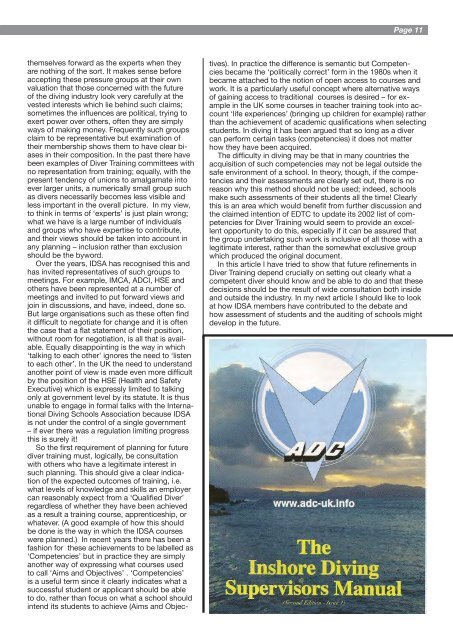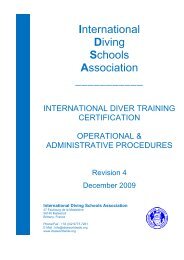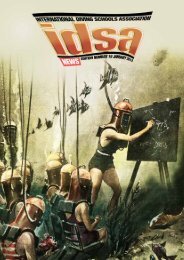Newsletter No. 20 - pdf ADOBE - IDSA The International Diving ...
Newsletter No. 20 - pdf ADOBE - IDSA The International Diving ...
Newsletter No. 20 - pdf ADOBE - IDSA The International Diving ...
You also want an ePaper? Increase the reach of your titles
YUMPU automatically turns print PDFs into web optimized ePapers that Google loves.
themselves forward as the experts when they<br />
are nothing of the sort. It makes sense before<br />
accepting these pressure groups at their own<br />
valuation that those concerned with the future<br />
of the diving industry look very carefully at the<br />
vested interests which lie behind such claims;<br />
sometimes the influences are political, trying to<br />
exert power over others, often they are simply<br />
ways of making money. Frequently such groups<br />
claim to be representative but examination of<br />
their membership shows them to have clear biases<br />
in their composition. In the past there have<br />
been examples of Diver Training committees with<br />
no representation from training; equally, with the<br />
present tendency of unions to amalgamate into<br />
ever larger units, a numerically small group such<br />
as divers necessarily becomes less visible and<br />
less important in the overall picture. In my view,<br />
to think in terms of ‘experts’ is just plain wrong;<br />
what we have is a large number of individuals<br />
and groups who have expertise to contribute,<br />
and their views should be taken into account in<br />
any planning – inclusion rather than exclusion<br />
should be the byword.<br />
Over the years, <strong>IDSA</strong> has recognised this and<br />
has invited representatives of such groups to<br />
meetings. For example, IMCA, ADCI, HSE and<br />
others have been represented at a number of<br />
meetings and invited to put forward views and<br />
join in discussions, and have, indeed, done so.<br />
But large organisations such as these often find<br />
it difficult to negotiate for change and it is often<br />
the case that a flat statement of their position,<br />
without room for negotiation, is all that is available.<br />
Equally disappointing is the way in which<br />
‘talking to each other’ ignores the need to ‘listen<br />
to each other’. In the UK the need to understand<br />
another point of view is made even more difficult<br />
by the position of the HSE (Health and Safety<br />
Executive) which is expressly limited to talking<br />
only at government level by its statute. It is thus<br />
unable to engage in formal talks with the <strong>International</strong><br />
<strong>Diving</strong> Schools Association because <strong>IDSA</strong><br />
is not under the control of a single government<br />
– if ever there was a regulation limiting progress<br />
this is surely it!<br />
So the first requirement of planning for future<br />
diver training must, logically, be consultation<br />
with others who have a legitimate interest in<br />
such planning. This should give a clear indication<br />
of the expected outcomes of training, i.e.<br />
what levels of knowledge and skills an employer<br />
can reasonably expect from a ‘Qualified Diver’<br />
regardless of whether they have been achieved<br />
as a result a training course, apprenticeship, or<br />
whatever. (A good example of how this should<br />
be done is the way in which the <strong>IDSA</strong> courses<br />
were planned.) In recent years there has been a<br />
fashion for these achievements to be labelled as<br />
‘Competencies’ but in practice they are simply<br />
another way of expressing what courses used<br />
to call ‘Aims and Objectives’ . ‘Competencies’<br />
is a useful term since it clearly indicates what a<br />
successful student or applicant should be able<br />
to do, rather than focus on what a school should<br />
intend its students to achieve (Aims and Objec-<br />
Page 11<br />
tives). In practice the difference is semantic but Competencies<br />
became the ‘politically correct’ form in the 1980s when it<br />
became attached to the notion of open access to courses and<br />
work. It is a particularly useful concept where alternative ways<br />
of gaining access to traditional courses is desired – for example<br />
in the UK some courses in teacher training took into account<br />
‘life experiences’ (bringing up children for example) rather<br />
than the achievement of academic qualifications when selecting<br />
students. In diving it has been argued that so long as a diver<br />
can perform certain tasks (competencies) it does not matter<br />
how they have been acquired.<br />
<strong>The</strong> difficulty in diving may be that in many countries the<br />
acquisition of such competencies may not be legal outside the<br />
safe environment of a school. In theory, though, if the competencies<br />
and their assessments are clearly set out, there is no<br />
reason why this method should not be used; indeed, schools<br />
make such assessments of their students all the time! Clearly<br />
this is an area which would benefit from further discussion and<br />
the claimed intention of EDTC to update its <strong>20</strong>02 list of competencies<br />
for Diver Training would seem to provide an excellent<br />
opportunity to do this, especially if it can be assured that<br />
the group undertaking such work is inclusive of all those with a<br />
legitimate interest, rather than the somewhat exclusive group<br />
which produced the original document.<br />
In this article I have tried to show that future refinements in<br />
Diver Training depend crucially on setting out clearly what a<br />
competent diver should know and be able to do and that these<br />
decisions should be the result of wide consultation both inside<br />
and outside the industry. In my next article I should like to look<br />
at how <strong>IDSA</strong> members have contributed to the debate and<br />
how assessment of students and the auditing of schools might<br />
develop in the future.




